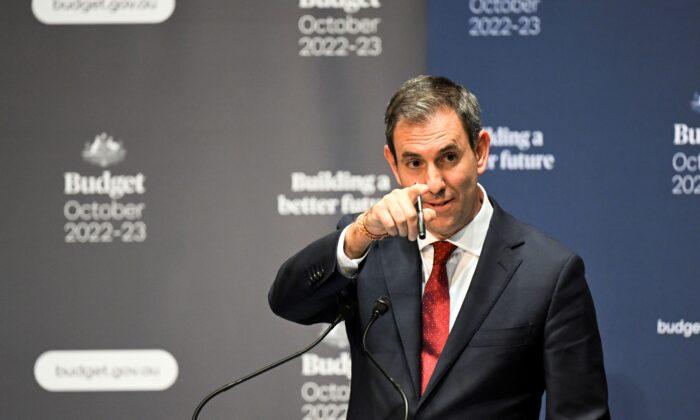Australia was a major contributor to, and beneficiary of, the rules-based world it helped “underwrite for the two decades between the Berlin Wall coming down, and the global financial system blowing up,” he said.
That “congenial” world had been “upended by the 2008 financial crisis, severe recessions in the U.S. and Europe, an uncertain recovery that ended with COVID, and a subsequent spike in inflation which crested not long ago.”
Lingering inflation, weak growth in China, population decline and a slowing in other large economies, the risk of higher oil prices due to the Middle East conflict, the continuing Ukraine war, and fragmenting supply chains all posed ongoing risks.Integration of Economic and Strategic Goals
Noting that U.S. National Security Adviser Jake Sullivan had last year given a speech at Brookings Institute saying Biden’s Inflation Reduction Act was as “much about security as prosperity.”“Just as when the Australian treasurer fronts the Lowy Institute 13 days from a budget, it tells you something about the fusion of Australia’s international and domestic ends and the integration of the government’s economic and strategic means.
Recent governments had assumed an artificial distinction between prosperity and security, but the current government was determined to “erode if not erase” this view.
“We recognise that in facing the most challenging strategic environment since World War II, economic resilience is an essential component of assuring our national security,” Mr. Chalmers explained.
“This is part of what our government means when we talk about the need for unprecedented coordination and ambition in our statecraft, harnessing all elements of our national power to advance Australia’s interests.”
The next decade would see heightened geostrategic competition, an international system under pressure, demographic change, greater risk of major shocks to supply chains, and a restructuring of global trade from the net zero transformation, the treasurer predicted.
“All these challenges require us to be engaged in the world and in our region,” he said. “But we also need to rethink how we act at home.
“The scale of subsidies in the three major global economies of course dwarfs anything Australia can offer ... but it would be preposterously self-defeating to leave our policies unchanged in the face of all this industry policy taking shape and taking hold around us.”
Australia’s opportunities lie at the intersection of industry, energy, resources, human capital, and its ability to attract and deploy investment, the treasurer said.
The government’s goals included aligning the country’s national security and economic security interests and making Australia “a renewable energy superpower and an indispensable part of the global net zero economy.”
5 Tests for Investment
These goals would be underpinned by the Future Made in Australia Act.“First, is the industry one where we can be competitive, and more productive? Second, does it contribute to an orderly path to net zero? Third, can it build the capabilities of our people and especially our regions? Fourth, will it improve Australia’s national security and economic resilience? And fifth, does it recognise the key role of the private sector and deliver genuine value for money for [the] government?” he revealed.
There would be two “streams” of projects: a “national interest” stream, where domestic sovereign capability is necessary to protect national security interests or ensure the economy is sufficiently resilient to shocks; and a net zero transformation stream, where industries support decarbonisation and there is a reasonable prospect of a self-sustaining comparative advantage.
The initial focus will be on refining and processing critical minerals, producing renewable hydrogen, exploring the production of “green” metals and low carbon liquid fuels, and supporting targeted manufacturing of clean energy technologies, including value adding in the battery supply chain, Mr. Chalmers announced.
Government Intervention Will Not Be Permanent
“But let me be clear—nobody is claiming we have the scale to compete in every industry. Nobody is saying that these interventions will be permanent, or that we should retreat from trade, or make every one of the goods that we need here.
“Nobody is saying we need to outspend or compete dollar-for-dollar with the scale or internal markets of bigger economies. And nobody is saying that this will involve solely public investment.”
Instead, “important and substantial” public investment would help “unlock the hundreds of billions of private capital.”
To attract that investment, the budget will include “financial incentives, regulatory changes, and other enablers” designed to attract private sector investment, along with an overhaul of the foreign investment framework.“Australia welcomes foreign investment but only if it’s in our national interest,” Mr. Chalmers said. “And global conditions ... demand a rethink of the regime that underpins it.”
The regime would be streamlined, he said, which meant “investors who we already know, who are making investments that don’t raise any sensitivities, and who have a good compliance record, get decisions faster.”The new target will be to process 50 percent of cases within an initial timeframe of 30 days, starting in January 2025.
The government will also dedicate more resources to screening foreign investment in critical infrastructure, minerals and technology, as well as those that involve sensitive data sets and investments near defence sites, to ensure “that all risks are identified, understood and can be managed.”
Mr. Chalmers said he believed Australia can become “an island of reliability in a sea of uncertainty. Creating a place for ourselves in this new economic order, powered by cleaner and cheaper energy. Becoming, in that effort, more secure as Australians.”




